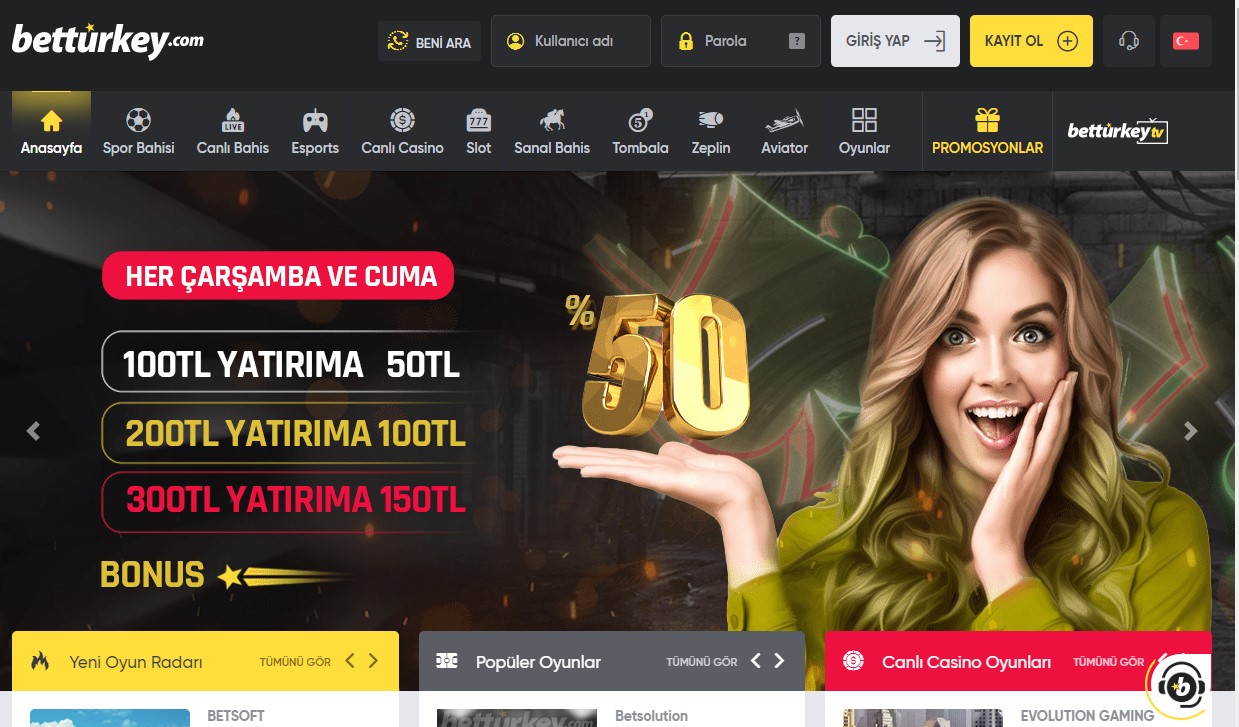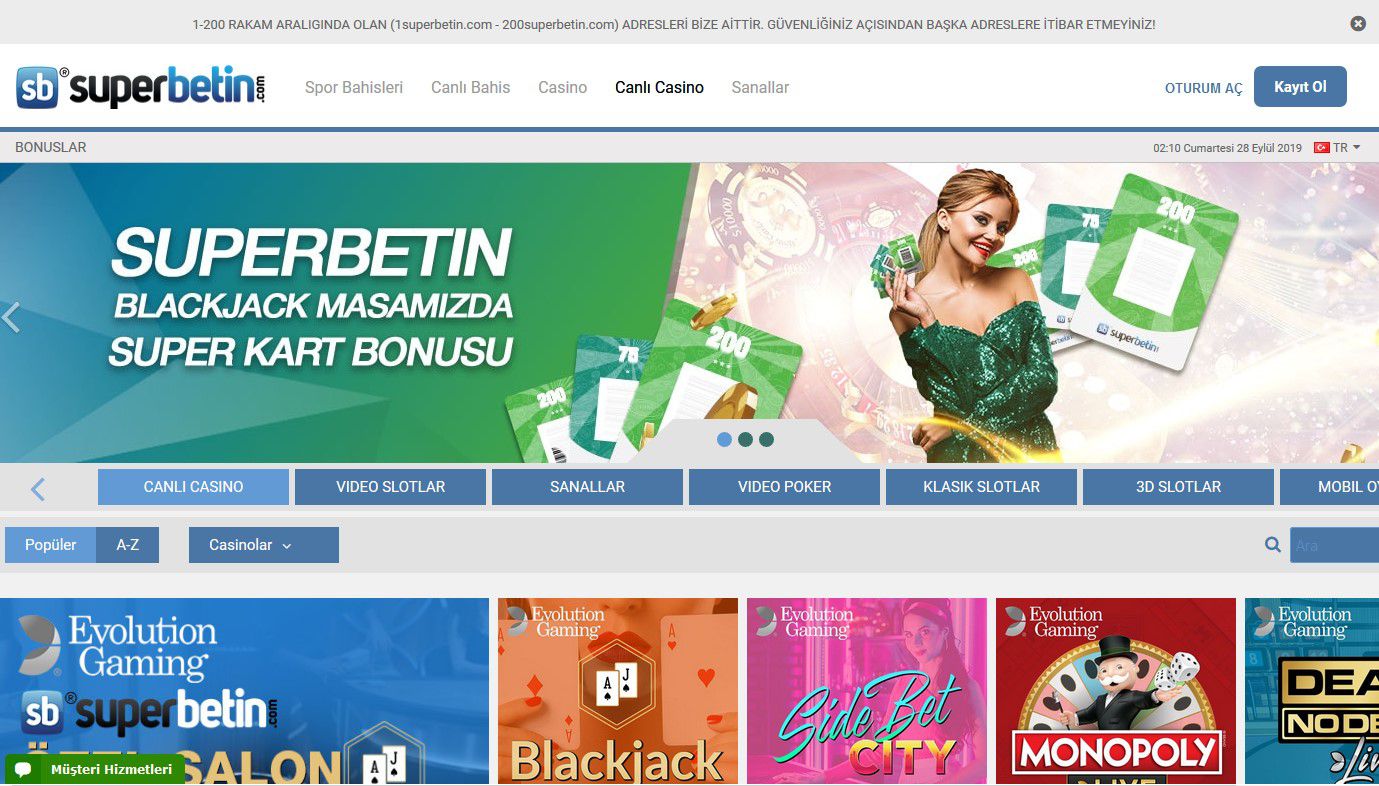Canlı bahis siteleri, kullanıcılara çeşitli bonuslar ve promosyonlar sunarak, müşteri memnuniyetini arttırmaya çalışırlar. Bu bonuslar arasında hoş geldin bonusları, kayıp bonusları ve para yatırma bonusları gibi seçenekler yer alır. Canlı bahis siteleri, kullanıcıların güvenliği için de çeşitli önlemler alır. Bu önlemler arasında SSL sertifikaları, güvenli ödeme yöntemleri ve kullanıcı bilgilerinin korunması gibi seçenekler yer alır.
Tavsiye Ettiğimiz Firmalar
Canlı bahis siteleri, kullanıcıların maçları canlı olarak takip etmelerini ve bahislerini anlık olarak değiştirmelerini sağlayan bahis siteleridir. Canlı bahis sitelerinde, kullanıcılar maçın gidişatına göre bahislerini değiştirebilirler. Bu sayede, kullanıcılar daha yüksek kazançlar elde edebilirler. Sonuç olarak, bahis sitelerinin casino ve canlı casino bonusları hakkında kullanıcı yorumları ve geri bildirimleri, bonusların kalitesi ve güvenilirliği hakkında önemli bilgiler sağlayabilir. Ancak, güvenilir kaynaklardan ve farklı kaynaklardan gelen yorumların ve geri bildirimlerin niteliğine, tarihine ve kullanıcıların profiline dikkat ederek, objektif bir değerlendirme yapmak önemlidir. Bahis siteleri, son yıllarda oldukça popüler hale gelmiştir. Bu siteler, kullanıcıların spor müsabakalarına ve diğer etkinliklere bahis yapmalarına olanak tanır. Bahis siteleri, genellikle yüksek oranlar sunarak kullanıcıların kazanç elde etmelerine yardımcı olur. Ancak, bu sitelerin güvenilir olması ve lisanslı olması önemlidir. Ayrıca, bahis yapmadan önce kullanıcıların bütçelerini belirlemeleri ve sorumlu bir şekilde bahis yapmaları da önemlidir.
| 100 TL Deneme Bonusu + 3500 TL Hoş Geldin | Bonus Alİncele | |
| 100 TL Bedava Deneme - 2500 TL Hoş Geldin | Bonus Alİncele | |
| 150 TL Bedava Deneme - 2000 TL Hoş Geldin | Bonus Alİncele | |
| %100 500 TL Hoş Geldin + %25 Yatırım Bonusu | Bonus Alİncele | |
| 150 FreeSpin + 15000 TL Hoş Geldin Bonusu | Bonus Alİncele | |
| 100 TL Bedava Deneme - 2500 TL Hoş Geldin | Bonus Alİncele | |
| 100 TL Deneme Bonusu - 5000 TL Hoş Geldin | Bonus Alİncele | |
| %100 5000 TL İlk Yatırım Bonusu | Bonus Alİncele | |
| 250 TL Deneme Bonusu - 3365 TL Hoş Geldin | Bonus Alİncele | |
| 1000 TL Hoş Geldin + %30 Spor Kayıp Bonusu | Bonus Alİncele | |
| 100 TL Bedava Deneme - 2500 TL Hoş Geldin | Bonus Alİncele | |
| 35 FreeSpin + 1500 TL Hoş Geldin | Bonus Alİncele | |
| 250 TL Bedava Deneme + 3000 TL İlk Yatırım | Bonus Alİncele | |
| 1000 TL Hoş Geldin + Her Gün Bedava 100 TL | Bonus Alİncele | |
| 1000 TL Hoş Geldin Bonusu + 50 Free Spin | Bonus Alİncele | |
| 1000 TL Hoş Geldin + 300 FreeSpin | Bonus Alİncele | |
| 6000 TL Hoş Geldin Bonusu + 300 Free Spin | Bonus Alİncele | |
| 3000 TL Hoş Geldin + %10 Kayıp İade | Bonus Alİncele | |
| %15 Çevrimsiz Yatırım Bonusu + %5 Free Spin | Bonus Alİncele | |
| 50 TL Deneme Bonusu + 10000 TL Hoş Geldin | Bonus Alİncele | |
| 5000 TL İlk Yatırım Bonusu + %10 Çevrimsiz | Bonus Alİncele | |
| 5000 TL İlk Yatırım Bonusu + %50 Çevrimsiz | Bonus Alİncele | |
| 500 TL Hoş Geldin + %25 Anlık Spor Discount | Bonus Alİncele | |
| 2500 TL Hoş Geldin + 250 Free Spin | Bonus Alİncele | |
| 1500 TL Hoş Geldin + 10 FreeSpin | Bonus Alİncele | |
| 250 TL Hoş Geldin + %20 QR Kod Yatırım Bonusu | Bonus Alİncele | |
| 1250 TL Hoş Geldin + 100 TL Davet Bonusu | Bonus Alİncele | |
| 250 TL Bedava Deneme + 3000 TL Hoş Geldin | Bonus Alİncele | |
| 1000 TL Hoş Geldin Bonusu + 50 Free Spin | Bonus Alİncele | |
| 500 TL Hoş Geldin + %20 Casino Discount | Bonus Alİncele | |
| 1500 TL Hoş Geldin + 100 TL Bedava Deneme | Bonus Alİncele | |
| 2000 TL Hoş Geldin + 75 Free Spin | Bonus Alİncele | |
| 50 TL Free Bet + 500 TL Hoş Geldin Bonusu | Bonus Alİncele | |
| 1500 TL Hoş Geldin + %20 Çevrimsiz Discount | Bonus Alİncele | |
| %100 500 TL Hoş Geldin Bonusu + %15 Çevrimsiz | Bonus Alİncele | |
| 500 TL Hoş Geldin + %20 Spor Kayıp Bonusu | Bonus Alİncele | |
| 50 TL Deneme Bonusu - 2000 TL Hoş Geldin | Bonus Alİncele | |
| 2000 TL Hoş Geldin + 50 Free Spin | Bonus Alİncele | |
| %20 1000 TL Yatırım Bonusu | Bonus Alİncele | |
| %300 1500 TL Hoş Geldin Bonusu | Bonus Alİncele | |
| Yeni Üyelere 1000 TL Nakit İade | Bonus Alİncele | |
| 1000 TL Hoş Geldin + 1000 TL Bedava Bahis | Bonus Alİncele | |
| 50 TL Deneme + 250 TL Hoş Geldin | Bonus Alİncele | |
| 50 TL Deneme + 400 TL Hoş geldin | Bonus Alİncele | |
| 100 TL Freebet + 100 Freespin | Bonus Alİncele | |
| %20 Çevrimsiz Spor Bonusu + %100 Free Bet | Bonus Alİncele | |
| 50 TL Free Bet + 250 TL Hoş Geldin Bonusu | Bonus Alİncele | |
| %100 2000 TL Slot & Casino Hoş Geldin Bonusu | Bonus Alİncele |
Tavsiye ettiğimiz firmalarda yatırım ve çekim işlemleri test edilmiştir. Slot oyunlarını öğrenin: Farklı slot oyunları farklı özelliklere sahip olabilir. Bazı oyunlarda özel semboller veya bonus turu gibi ekstra özellikler bulunur. Bu özellikleri öğrenmek, oyun deneyiminizi geliştirebilir ve kazanma şansınızı artırabilir. İletişim Kanalları: Bahis siteleri, müşteri desteği hizmetleri için farklı iletişim kanalları sunar. Telefon, e-posta, canlı sohbet veya sosyal medya gibi kanallar aracılığıyla müşteri hizmetleri temsilcileriyle iletişim kurulabilir. Kullanıcılar, müşteri desteği hizmetlerine erişmek için hangi kanalların mevcut olduğunu kontrol etmelidirler. Bonus veya promosyonu aldıktan sonra, bahis sitesinin belirli bir kural ve şartları vardır. Bu şartları dikkatlice okuyun ve bonus veya promosyonu kullanmadan önce buna uygun Promosyon davranın.
Diğer Firmalar:
Tombala oyunu, genellikle ülkeden ülkeye değişmekle birlikte, genellikle belirli yaş sınırı ve kısıtlamaları ile ilişkilendirilir. Örneğin, bazı ülkelerde tombala oyunu oynamak için en az 18 yaşında olmanız gerekiyor. Bazı ülkelerde ise tombala oyunu oynamak için 21 yaşında olmanız gerekebilir. Yaş sınırı ve kısıtlamaları, ülkelerin yasalara ve düzenlemelerine bağlıdır.
Bahis sitesinin güncel giriş adresini nasıl bulabilir ve güvenilir kaynaklardan bu bilgiye nasıl ulaşılabilir?
Çevrim şartlarını tamamladıktan sonra, bonus miktarı nakit olarak çekilebilir veya diğer bahis veya casino oyunlarında kullanılabilir. Ancak, herhangi bir çevrim şartını yerine getirmeden önce bonusu nakit olarak çekmeniz mümkün olmayabilir. Ayrıca, farklı oyunlar farklı şekillerde katkıda bulunabilir ve her bahis sitesinin kendi kuralları ve şartları olabilir, bu nedenle bonus şartlarını okumak önemlidir.
Minimum oran: Bahis siteleri, bonusun kullanılması için belirli bir minimum bahis oranı belirleyebilirler. Bu oran genellikle 1.50 veya daha yüksektir.
Mobil bahis ve casino sitelerinde, kullanıcılar genellikle yüksek oranlarla karşılaşırlar. Bu oranlar, kullanıcılara daha yüksek kazançlar elde etme imkanı verir. Ayrıca, mobil bahis ve casino sitelerinde pek çok bonus ve promosyon da bulunur. Bu bonuslar, kullanıcıların hesaplarına ekstra para yatırmasına olanak sağlar ve kazanma şansını arttırır.
Güçlü Parola ve Kimlik Doğrulama: Bahis siteleri, kullanıcıların hesaplarının güvenliği için güçlü parolaların kullanımını zorunlu hale getirirler. Ayrıca, kullanıcıların kimliklerini doğrulamalarını sağlayan farklı doğrulama yöntemleri de kullanılır.
Para yatırma ve çekme işlemleri için işlem süresini takip edin: Para yatırma ve çekme işlemleri için belirli işlem süreleri belirlenir. İşlem sürelerini takip ederek, işlemlerinizin ne zaman tamamlanacağını öğrenebilirsiniz.
Ancak, canlı bahis siteleri seçerken dikkatli olmak gerekir. Lisanslı ve güvenilir siteler tercih edilmelidir. Ayrıca, canlı bahis yaparken bütçe planlaması yapmak ve sorumlu bir şekilde bahis yapmak önemlidir.



